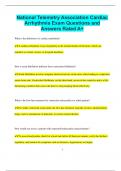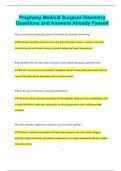latest updated documents, correct, verified & graded A study materials
get bundles, documents, test banks, case studies, shadow health's, ATIs, HESIs, study guides, summary, assignments & every kind of study materials.
- 14200
- 0
- 1054
Community
- Followers
- Following
681 Reviews received
15298 items

Telemetry Monitor Questions And Answers Graded A+
Telemetry Monitor Questions And Answers Graded A+ What does a telemetry system alert you to? Telemetry systems alert healthcare providers to abnormal changes in vital signs such as heart rate, rhythm, or oxygen saturation, enabling timely interventions. How does telemetry help in post-surgical monitoring? After surgery, telemetry provides constant monitoring of a patient’s heart and respiratory status, allowing for early detection of complications such as arrhythmias or respirator...
- Package deal
- Exam (elaborations)
- • 11 pages •
Telemetry Monitor Questions And Answers Graded A+ What does a telemetry system alert you to? Telemetry systems alert healthcare providers to abnormal changes in vital signs such as heart rate, rhythm, or oxygen saturation, enabling timely interventions. How does telemetry help in post-surgical monitoring? After surgery, telemetry provides constant monitoring of a patient’s heart and respiratory status, allowing for early detection of complications such as arrhythmias or respirator...

National Telemetry Association Cardiac Arrhythmia Exam Questions and Answers Rated A+
National Telemetry Association Cardiac Arrhythmia Exam Questions and Answers Rated A+ What is the definition of a cardiac arrhythmia? A cardiac arrhythmia is any irregularity in the normal rhythm of the heart, which can manifest as a faster, slower, or irregular heartbeat. How is atrial fibrillation different from ventricular fibrillation? Atrial fibrillation involves irregular electrical activity in the atria, often leading to a rapid and erratic heart rate. Ventricular fibril...
- Package deal
- Exam (elaborations)
- • 8 pages •
National Telemetry Association Cardiac Arrhythmia Exam Questions and Answers Rated A+ What is the definition of a cardiac arrhythmia? A cardiac arrhythmia is any irregularity in the normal rhythm of the heart, which can manifest as a faster, slower, or irregular heartbeat. How is atrial fibrillation different from ventricular fibrillation? Atrial fibrillation involves irregular electrical activity in the atria, often leading to a rapid and erratic heart rate. Ventricular fibril...

Prophecy Medical Surgical-Telemetry Questions and Answers Already Passed
Prophecy Medical Surgical-Telemetry Questions and Answers Already Passed How do you ensure proper placement of electrodes for telemetry monitoring? Electrodes should be placed on clean, dry skin with proper contact, avoiding areas with excessive hair or scar tissue to ensure accurate readings and signal transmission. What should be the first step when a telemetry alarm sounds indicating a potential issue? The first step is to assess the patient’s condition, check the lead connections...
- Package deal
- Exam (elaborations)
- • 17 pages •
Prophecy Medical Surgical-Telemetry Questions and Answers Already Passed How do you ensure proper placement of electrodes for telemetry monitoring? Electrodes should be placed on clean, dry skin with proper contact, avoiding areas with excessive hair or scar tissue to ensure accurate readings and signal transmission. What should be the first step when a telemetry alarm sounds indicating a potential issue? The first step is to assess the patient’s condition, check the lead connections...

A&C Practice Dysrhythmias 2 Questions and Answers Graded A+
A&C Practice Dysrhythmias 2 Questions and Answers Graded A+ What is a common sign of atrial fibrillation (AFib)? A common sign of AFib is an irregular and often rapid heart rate, which may be felt as palpitations in the chest or as a fluttering sensation. What does a prolonged PR interval indicate in an electrocardiogram (ECG)? A prolonged PR interval may indicate a first-degree heart block, where the electrical impulse takes longer than normal to travel from the atria to the ventri...
- Exam (elaborations)
- • 9 pages •
A&C Practice Dysrhythmias 2 Questions and Answers Graded A+ What is a common sign of atrial fibrillation (AFib)? A common sign of AFib is an irregular and often rapid heart rate, which may be felt as palpitations in the chest or as a fluttering sensation. What does a prolonged PR interval indicate in an electrocardiogram (ECG)? A prolonged PR interval may indicate a first-degree heart block, where the electrical impulse takes longer than normal to travel from the atria to the ventri...

EKG PRACTICE EXAM 3 WITH VERIFIED SOLUTIONS
EKG PRACTICE EXAM 3 WITH VERIFIED SOLUTIONS What is the P wave in an EKG? The P wave represents atrial depolarization, which is the electrical impulse that triggers the contraction of the atria. What does the PR interval indicate in an EKG? The PR interval represents the time it takes for the electrical signal to travel from the atria to the ventricles, including the delay at the AV node. What is the normal duration for the QRS complex? The normal duration for the QRS comple...
- Exam (elaborations)
- • 10 pages •
EKG PRACTICE EXAM 3 WITH VERIFIED SOLUTIONS What is the P wave in an EKG? The P wave represents atrial depolarization, which is the electrical impulse that triggers the contraction of the atria. What does the PR interval indicate in an EKG? The PR interval represents the time it takes for the electrical signal to travel from the atria to the ventricles, including the delay at the AV node. What is the normal duration for the QRS complex? The normal duration for the QRS comple...

Telemetry Strips Questions and Answers Rated A+
Telemetry Strips Questions and Answers Rated A+ What is the first step in analyzing a telemetry strip? The first step is to identify the rhythm, which involves examining the P waves, QRS complexes, and T waves to assess the heart’s electrical activity. What is an abnormal finding when analyzing a telemetry strip? An abnormal finding can be an irregular rhythm, such as ventricular fibrillation, or the presence of premature beats, which may indicate arrhythmias or other heart issues...
- Package deal
- Exam (elaborations)
- • 9 pages •
Telemetry Strips Questions and Answers Rated A+ What is the first step in analyzing a telemetry strip? The first step is to identify the rhythm, which involves examining the P waves, QRS complexes, and T waves to assess the heart’s electrical activity. What is an abnormal finding when analyzing a telemetry strip? An abnormal finding can be an irregular rhythm, such as ventricular fibrillation, or the presence of premature beats, which may indicate arrhythmias or other heart issues...

Telemetry & ECG Questions and Answers Graded A+
Telemetry & ECG Questions and Answers Graded A+ What does a flatline on a telemetry monitor indicate? A flatline typically indicates the absence of electrical activity in the heart, often signaling asystole, which is a life-threatening situation requiring immediate intervention such as CPR. What is the significance of ST-segment elevation on an ECG? ST-segment elevation on an ECG may indicate myocardial infarction (heart attack), signaling that part of the heart muscle is not receiv...
- Package deal
- Exam (elaborations)
- • 29 pages •
Telemetry & ECG Questions and Answers Graded A+ What does a flatline on a telemetry monitor indicate? A flatline typically indicates the absence of electrical activity in the heart, often signaling asystole, which is a life-threatening situation requiring immediate intervention such as CPR. What is the significance of ST-segment elevation on an ECG? ST-segment elevation on an ECG may indicate myocardial infarction (heart attack), signaling that part of the heart muscle is not receiv...

Telemetry Test Questions and Answers Already Passed
Telemetry Test Questions and Answers Already Passed What action should be taken when a telemetry monitor shows a flat line on the ECG display? A flat line may indicate a loss of signal, which can be caused by disconnected electrodes, poor electrode contact, or the patient moving. Recheck the electrode placement and ensure they are firmly attached. If a telemetry alarm signals a significant drop in heart rate, what is the next step? You should assess the patient immediately for sympt...
- Package deal
- Exam (elaborations)
- • 8 pages •
Telemetry Test Questions and Answers Already Passed What action should be taken when a telemetry monitor shows a flat line on the ECG display? A flat line may indicate a loss of signal, which can be caused by disconnected electrodes, poor electrode contact, or the patient moving. Recheck the electrode placement and ensure they are firmly attached. If a telemetry alarm signals a significant drop in heart rate, what is the next step? You should assess the patient immediately for sympt...

BAMC Tele Questions and Answers Already Passed
BAMC Tele Questions and Answers Already Passed What’s the difference between an artifact and a real event in telemetry monitoring? An artifact in telemetry is caused by external factors like patient movement or poor electrode contact, leading to false alarms, while a real event is an actual physiological change such as arrhythmia or ischemia. How can you distinguish between a PVC (premature ventricular contraction) and a normal beat on telemetry? A PVC typically occurs earlier th...
- Exam (elaborations)
- • 11 pages •
BAMC Tele Questions and Answers Already Passed What’s the difference between an artifact and a real event in telemetry monitoring? An artifact in telemetry is caused by external factors like patient movement or poor electrode contact, leading to false alarms, while a real event is an actual physiological change such as arrhythmia or ischemia. How can you distinguish between a PVC (premature ventricular contraction) and a normal beat on telemetry? A PVC typically occurs earlier th...

Cardiac Telemetry Questions and Answers 100% Pass
Cardiac Telemetry Questions and Answers 100% Pass How does telemetry help in the early detection of arrhythmias? Telemetry provides continuous heart monitoring, allowing healthcare providers to detect arrhythmias such as atrial fibrillation or ventricular tachycardia as soon as they occur, enabling timely interventions. Why is it important to monitor heart rate variability in telemetry? Heart rate variability can provide insight into the autonomic nervous system’s function, and s...
- Package deal
- Exam (elaborations)
- • 26 pages •
Cardiac Telemetry Questions and Answers 100% Pass How does telemetry help in the early detection of arrhythmias? Telemetry provides continuous heart monitoring, allowing healthcare providers to detect arrhythmias such as atrial fibrillation or ventricular tachycardia as soon as they occur, enabling timely interventions. Why is it important to monitor heart rate variability in telemetry? Heart rate variability can provide insight into the autonomic nervous system’s function, and s...

NIC Esthetics Practice Test Questions and Answers 100% Pass
Cosmetology Clinical exam Questions and Answers 100% Pass
Health and Nutrition D440 OA Prep Questions and Answers Already Passed
WGU Nutrition D440 Competed Study Guide Questions with Verified Solutions
D440 Health and Wellness EAQ Questions and Answers Graded A+